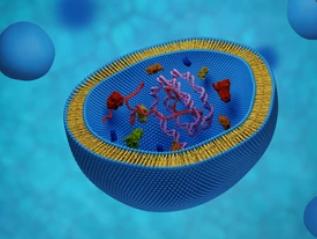Exosomes for ASO Delivery
Online InquiryAntisense oligonucleotides (ASOs) are one of the important DNA species. As single-stranded DNA molecules, ASOs typically consist of 12-25 nucleotides that regulate RNA function via several mechanisms. In addition to being a powerful molecular tool for protein and RNA biology research, ASOs represent a highly selective therapeutic strategy for many diseases associated with gene expression disorders. To date, there are more than ten ASOs approved by the Food and Drug Administration (FDA). However, ASO molecules are difficult to cross the cell membrane by themselves and are easily and rapidly degraded by proteases. There is an urgent need to successfully load specific ASOs into cells, and exosomes are a novel and safer delivery method.

Exosome-based ASO delivery
Exosomes are considered to be natural carriers for transporting RNA and DNA to cells. ASOs are negatively charged DNA molecules and can be transported by exosomes for various disease treatments. Successful loading of ASOs into the exosomes is the key to exosome-mediated ASO for disease treatment due to the strong anionic nature of ASOs. When using exosomes for the delivery of ASO, electroporation is the widely used method to load these DNA molecules into vesicles. The principle of electroporation is that it increases the permeability of the exosomes, thus facilitating the entry of cargo into the vesicles. Moreover, electroporation has the ability to deliver more than two different ASOs into the same vesicles. However, during encapsulation, electroporation can lead to the formation of exosome and nucleic acid aggregates, which can affect the function of ASOs. To address these issues, optimization of electroporation parameters may be required.
Applications of exosome-mediated ASOs
- Neurodegenerative disease treatment, such as Parkinson's disease (PD) and amyotrophic lateral sclerosis (ALS)
- Cancer treatment, such as glioblastoma (GBM), colorectal cancer, and hepatocellular carcinoma
Support of exosomes as drug carriers
Creative Proteomics has over a decade of experience in exosome multi-omics services and has provided quality services to our global clients. Our dedicated team is able to provide exosome research to researchers in pharmaceutical, biotechnology as well as academic and government institutions. We offer the following list, including but not limited to:
| Exosome analysis services | |
|---|---|
| Exosome isolation and purification | Sucrose gradient centrifugation |
| Polymer-based exosome enrichment method | |
| Immunomagnetic bead method | |
| Size exclusion chromatography method | |
| Exosome identification | Nanoparticle tracking analysis (NTA) |
| Electron microscopy analysis | |
| Western blot | |
| Exosome marker assay | Isolation and enrichment of exosomal CD9, CD63, CD81, TSG101, HSP70 proteins |
| Exosome surface protein identification and quantitative analysis | |
| Exosome engineering | Exosome labeling and tracking |
| Cargo loading | |
| Engineered exosome production | |
| Cargo loading assessment | |
| Exosomes labeling and tracking | Exosome fluorescent labeling |
| Fluorescence exosome purification | |
| Fluorescent exosome concentration labeling | |
| Exosome multiomics analysis | Exosome proteomics analysis: Exosome protein profile identification Exosome protein composition analysis Exosome protein expression level analysis Exosome protein differential expression analysis |
| Exosome metabolomics analysis: Exosome differential metabolite screening Qualitative and quantitative analysis of target metabolites/metabolic pathways | |
| Exosome lipidomics analysis: Exosome lipid composition and level analysis Differential expression analysis of exosomal lipid molecules Qualitative and quantitative analysis of targeted lipid molecules | |
| Exosomal biogenesis and identification | Our capabilities will provide strong support for the study of exosome biogenesis and its identification. |
| Exosomal cargo and loading mechanism | Our services can greatly help the study of exosomal cargo and loading mechanism, facilitating the diagnostic and therapeutic applications of exosomes. |
| Exosome function research | In vitro analysis of the function of exosomes In vivo analysis of the function of exosomes |
Please contact us for more about our exosome analysis services. If you don't find what you're looking for, drop us a line and our team will get back to you shortly.
Reference
- Zhang, Ying, et al. "Recent advances in exosome-mediated nucleic acid delivery for cancer therapy." Journal of Nanobiotechnology 20.1 (2022): 1-29.
* For Research Use Only. Not for use in diagnostic procedures.



